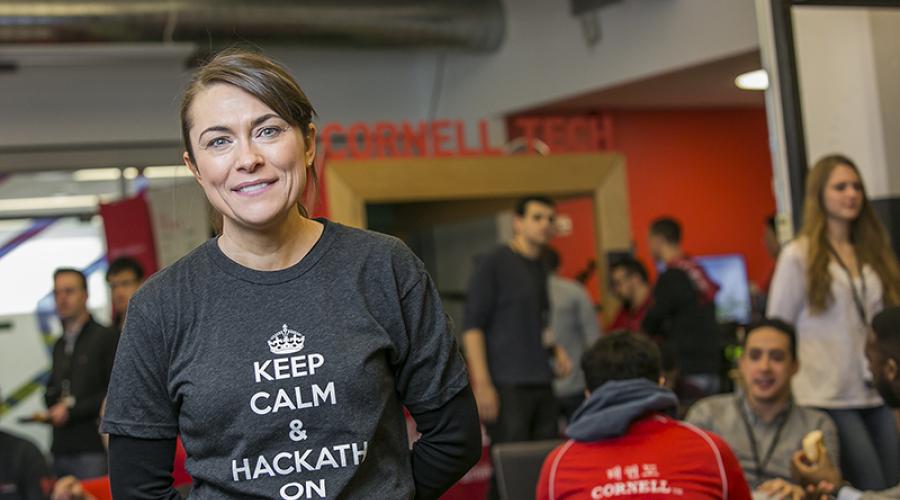
"Best Job Ever"
Ami Stuart ’10 turns down the heat before every hackathon she hosts.
As tech events manager for Entrepreneurship at Cornell — “the best job ever” — she knows that 125 students and their laptops will heat up the space in no time.
The energy unleashed as teams of Cornellians from diverse disciplines — English literature majors are as welcome as Weill Medical College physician trainees — focus brainpower on a challenge they have 24 hours to solve.
Working with faculty and staff from all of Cornell's colleges, departments, majors and degree programs, and coaches and judges from diverse industries, Stuart taps deeply into her ILR organizational behavior learning as she organizes events.
Transparency is key, she said. Each team of four to six student hackers is given the same datasets, the same protocols and tools for building software applications, the same access to volunteer mentors, the same fresh coffee, the same healthy foods.
Students are encouraged to check their egos at the door, open their minds, be vulnerable, be Maximum Brain Power creative, let go of any wallflower inclinations.
“We create the environment, put structures in place. We make it a safe exploration.”
Students immerse themselves in the challenge and create a solution to an overarching pain point, usually outlined the Friday night before the Saturday start of a hackathon.
Stuart’s goal at each of the 12 events she hosts yearly — on campus or at Cornell Tech’s temporary quarters in Manhattan — is to create impactful experiences for students.
“You work in close quarters, under an extreme time constraint, with little sleep. It’s anxiety, pressure and, in the end, you have diamonds — the fruits of the labor.”
In a speed round at the far end of the 24-hour cycle, the top 10 teams are selected to do four-minute presentations and demonstrations for a panel of judges, who can ask each team questions for up to six minutes before deciding which group walks away with $1,000-plus in cash and prizes.
Some of those experiences are turning into internships, full-time jobs and revenue generating startup companies.
Pablo Borquez MBA ’15 debuted his Produce Pay concept at the university’s Fintech Hackathon in 2014, refined it and turned it into a company that now employs 11 people, Stuart said.
Hackathons sometimes result in ready-to-implement improvements for communities.
One project developed at Cornell’s Random Hacks of Kindness was a cloud-based recordkeeping system for the Afya Foundation’s rehabilitation clinic in Haiti. Another created an online recordkeeping system for the Ithaca Community Gardens.
The world’s first ever veterinary science hackathon is slated for the 2016-17 academic year at the Cornell College of Veterinary Medicine, Stuart said.
Many students are finding mentors among the dozens of executives who volunteer as hackathon coaches and judges.
“People want to share their knowledge, pass it onto the next generation,” Stuart said. “We’re able to get amazing people — some fly in from California — and it’s all pro bono.”


